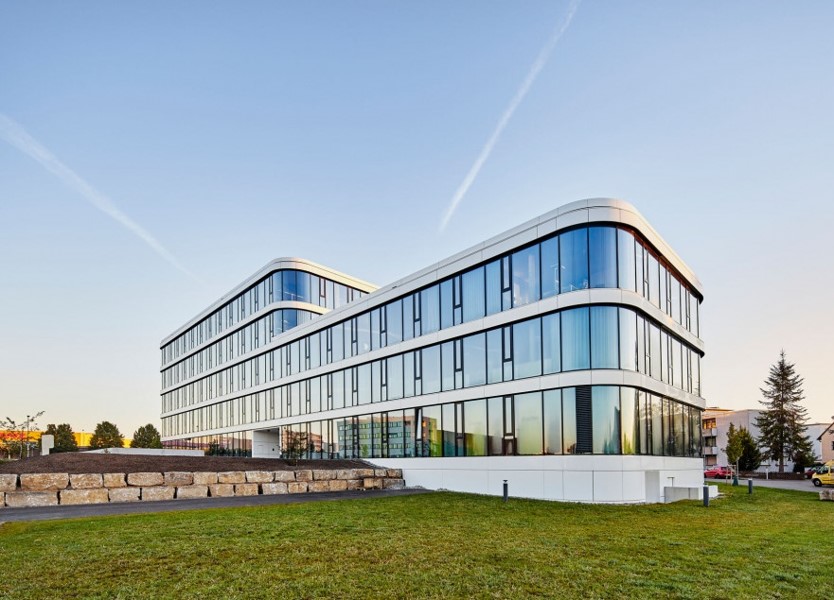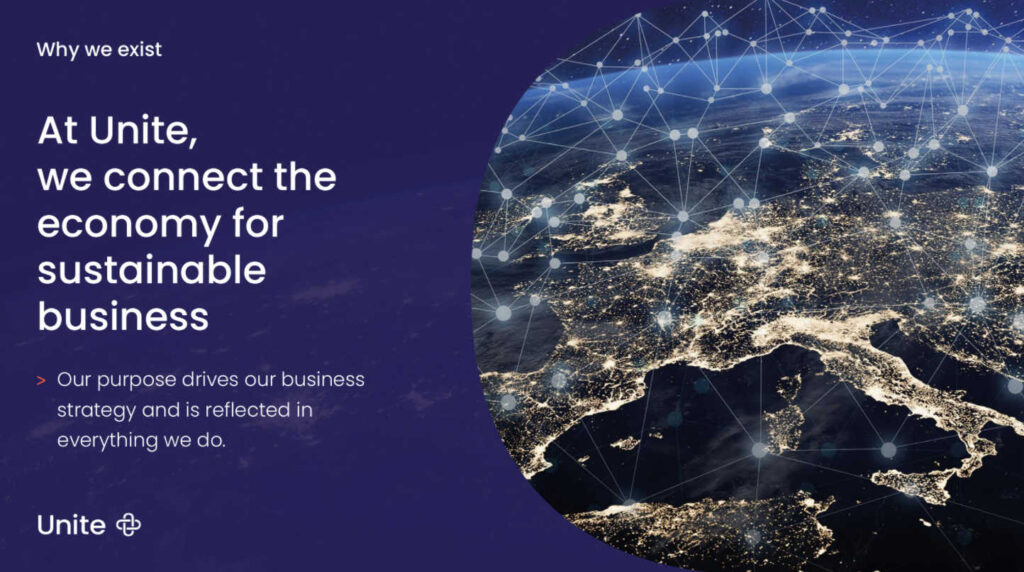We want to provide a practical insight into the Preparation of a materiality analysis and the preparation of a DNK report. We asked our customers, All for One Group SE and Unite Network SE, what experiences they have had in the process and what they would like to pass on to others. Among other things, they talk about the benefits of a materiality analysis, surprises along the way and what a sustainability report brings them today.

All for One: Materiality analysis and DNK report at an IT service provider
About the All for One Group
OUR MISSION IS TO INCREASE OUR CUSTOMERS' COMPETITIVENESS IN A DIGITAL WORLD.
In this mission and self-imposed task, we give our best every day with 2,500 experts from All for One Group SE and support our more than 3,000 customers from Germany, Austria, Poland and Switzerland in their corporate transformation and the digitalisation of all business areas. Our fields of action range from cybersecurity, new work, customer & employee experience and data & business analytics to machine learning and managed services. As a listed consulting and IT group, we have a high level of process and industry expertise combined with in-depth technological know-how. Our customers are primarily at home in the (upper) midmarket and the manufacturing industry. Our large portfolio consists of market-leading solutions and services based on SAP, Microsoft & IBM, which are used throughout the company - and across borders - and contribute to the competitive strength of our customers.
What has the materiality analysis brought you?
The materiality analysis allows us to see which sustainability aspects are really relevant for us. It helps us to prioritise which topics we really need to tackle. At the moment in particular, there are a lot of initiatives and opportunities to get involved in sustainability, which harbours the risk of rushing into many topics at the same time, even if they are perhaps not that relevant. At the same time, it also shows us in which aspects of sustainability we are already doing something, i.e. are effective, and in which we are not yet effective. This also creates transparency and clarity for our stakeholders. Another point is that the materiality analysis influences the direction of our sustainability strategy and we will derive our goals from the analysis.
What was perhaps surprising for you about the reporting process?
What surprised us was the extent to which we ended up reporting. At the beginning, we didn't realise that we were already doing so much in the various aspects of sustainability. At the same time, we were able to recognise many points of contact for our customers during the process. Which we will now take up in order to support our customers on the path to sustainability. Another point is that we have received very positive feedback from our employees, with a lot of willingness to support the next steps, which we had not expected. For us at All for One, it's really only just getting started: setting targets, determining and taking measures, such as green finance, CO2 reduction, involving external partners for our customers, etc.
What insight or recommendation would you give to other companies?
The effort involved should not be underestimated. It was no small effort to collate all the figures, especially at the end. Another realisation is that you should follow the questions very closely when preparing the report and not create texts that are too free. In addition, the support provided by Plant Values helped us a lot. Both in preparing the materiality analysis and in compiling the key content for the report. In any case, we can say that the external perspective of an external consultant is very helpful in the process, especially for the first report. In particular, the sparring and exchange of ideas helped us a lot in taking the next steps.

Unite: A DNK report for a B2B e-commerce platform
About Unite
At Unite, we connect the economy for sustainable business. Our pioneering B2B platform unites buyers and suppliers for mutual benefit. Our digital solutions make procurement, purchasing and sales as well as processing and collaboration simple and efficient.
Unite solutions include the Spotmarket, the Procurement Portal (Mercateo) and Financial Services (in partnership with an authorised e-money institution), embedded in the Unite platform.
With the scalable and flexible infrastructure of our platform, we facilitate business relationships and support their stability and the resilience of supply chains. Our ever-growing ecosystem includes buyers, suppliers, manufacturers, service providers, technology partners and networks.
Our strong foundation rests on Mercateo's in-depth experience with the B2B marketplace and on its History which began in 2000. Fair competition, trusting partnerships and European data sovereignty determine our actions.
We are reshaping B2B commerce and strengthening the regional economy by creating and sharing more value. "For better business and a better world."
Our head office is located in Leipzig, Germany. More than 700 people work in 15 countries for Unite. In the year 2020 our company achieved a turnover of 343 million euros. You can find more information at unite.eu.
Why did you decide to create a sustainability report?
At Unite, we connect the economy for sustainable business, create shared value for all our platform participants and cultivate long-lasting relationships with our customers and partners. Sustainability is not only part of our business, but is also actively practised as a corporate value. Intrinsically motivated, Unite employees have joined forces to form a corporate health management team and an environmental sustainability team and have demonstrated social commitment in many projects.
The topic of sustainability is more important than ever. We wanted to find out exactly where we stand in the ESG area. The sustainability report has given us the opportunity to summarise our ESG activities in a structured way and identify potential for further development. We don't want to rest on our laurels, we want to continuously improve. By publishing the report, we make all this information transparent, both for our colleagues and for external market participants.
How has the report in accordance with the DNK standard helped you in your internal sustainability management?
The report in accordance with the DNK standard has made it clear to us which topics are material and where there are major levers for making a sustainable contribution. The breakdown into various criteria has clearly shown how comprehensive a holistic ESG assessment is and which key topics can be assigned to sustainability management. For this reason, we have defined clear responsibilities: there is one person responsible for implementing sustainability aspects of our business activities, another for sustainability in relation to business operations and another for compliance issues. They work closely together as a team to drive issues forward.
The structure of the report in accordance with the DNK means that our status quo is recorded in a structured manner in cooperation with the various areas of the company. At the same time, it became clear in which areas we still have deficits and need to set ourselves new goals. The definition of targets, indicators and measures leads to a commitment on the part of all divisions involved and a greater awareness of the importance of sustainability.
What insight or recommendation would you give to other companies?
Anyone who has not yet established active sustainability management within the company, as was the case with us, should call in an external consultant to find out which topics are important for their own company. Otherwise, there is a risk of continuing to develop topics that have no impact on society and the environment.
We have also learnt in this process that communication is extremely important. Many people see the topic of sustainability as an additional expense, an objection that is certainly justified in one place or another. It helps to listen and give detailed reasons as to why a new direction and process change makes sense.
A good way to pick up colleagues is to integrate them into workshops and draw on their expertise and ideas.
One learning that we must constantly remind ourselves of is to think long-term. Even if something doesn't seem realistic to implement at the moment, you should take steps and pursue goals.

We work with companies on sustainability.
Strategy, controlling and corporate culture for sustainability.
For complex topics such as this, we provide advice, act as a sparring partner or provide impetus. If you would like to find out more about this topic or even tackle it yourself, please write to us:

One comment
Comments are closed.